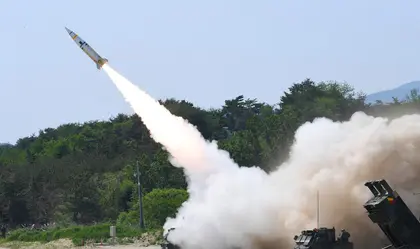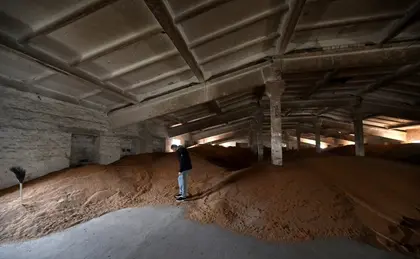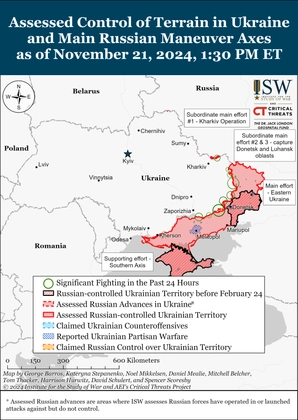Vladimir Putin wages genocide, not war, against Ukrainians, as he made clear from the outset of his invasion. His hero, Josef Stalin, did the same and starved to death 3.5 million Ukrainians in 1932 and 1933 for the crime of refusing to leave their farms for collectives. This “Holodomor” has been condemned by the Vatican, European Union, and recently France’s Senate, as genocide or “acts committed with intent to destroy, in whole or in part, a national, ethnical, racial or religious group.”
JOIN US ON TELEGRAM
Follow our coverage of the war on the @Kyivpost_official.
Now Putin perpetrates a bigger genocide by imperilling the hundreds of millions of poor people who rely on Ukrainian food supplies. He has intentionally crippled Ukraine’s food exports, bombed and contaminated 25 percent of its valuable food lands, and planted deadly landmines across countryside the size of Switzerland, making farming dangerous. Putin is destroying one the planet’s most valuable growing regions, a factor this has finally led African leaders to join forces to try and stop Russia’s war.
Russia blames the West for global food shortages and inflation, but Arif Husain, chief economist at the UN World Food Programme, said “we tend to address the symptoms and forget the root cause, and the root cause is war,” he said last fall. “The numbers do not lie. Pre-Covid we were looking at about 135 million people in crisis or the worst type of food security situation.

Eurotopics: Ukraine Hits Russian Target with US Missiles
Today, including Ukraine’s impact, that number is 345 million. There are about 50 million people in the world who are what we call in hunger emergencies, meaning one step away from famine. That’s the magnitude, that’s the scale of the problem we’re talking about.”
This crisis is about more than stopping grain shipments in the past year. Putin sets out to permanently destroy Ukraine’s productivity — one of the world’s top agricultural exporters and the “breadbasket” of Europe. Its lands are the world’s most fertile, blanketed in feet of “Chernozem” or “black earth”. This soil is so rich that during World War 2 some Nazis shipped hundreds of train loads back to Germany as they invaded.
After the war, Ukraine was cultivating an area the size of Italy and by 2019 overtook Russia as the world’s largest grain exporter. Now Russia’s atrocities haves sliced yield by one-third because land mines block prevent farming and Russian shelling has damaged one-quarter of all Ukraine’s land mass. The countryside is scarred with pock marks — a vicious attack without value other than to permanently destroy the agricultural base.
“Two dozen experts who spoke with Reuters — including soil scientists, farmers, grain companies and analysts — said it would take decades to fix the damage to Europe's breadbasket due to contamination, mines and destroyed infrastructure - and that global food supplies could suffer for years to come.
Shelling has also upset the delicate ecosystems of microorganisms that turn soil materials into crop nutrients such as nitrogen while tanks have compressed the earth, making it harder for roots to flourish,” reported Indian broadcast network NDTV.
Natalia Shapoval, Vice President at the Kyiv School of Economics, outlined the damage and challenges to agriculture caused by the war. “About 70 per cent of Ukraine is farmland, and its 8.3 farmers need $34 billion [in investments] a year to grow and harvest their crops,” she said. “De-mining this much land requires a technological solution or will take 1,000 years to do.”
Land mines are everywhere, in towns, utilities, fields, major roads, and forests. Priority is given to de-mining urban areas, but some of Ukraine’s resourceful farmers have come up with methods to de-mine their own fields. Oleksandr Kryvtsov, a farmer near Kharkiv, reinforced his tractor with pieces scavenged from wrecked Russian tanks to de-mine his land. His tractor can detect mines, remove them, and withstand explosions.
“We ran over an anti-tank mine. The protection got blown out (but) the tractor is safe," he told Reuters. "Everyone's alive and safe. The equipment was restored and repair was made."
Ukraine’s IT sector also works on ways to safely and remotely de-mine the country by harnessing drones, satellite mapping, robotics, and software. In early April, the World Bank estimated de-mining Ukraine would cost more than $37 billion, and is a priority after the war ends because Russia’s damage to Ukrainian agriculture puts at risk all food markets as well as hundreds of millions of lives. The European Council wrote that “Russia’s unprovoked and unjustified aggression against Ukraine has had a significant and lasting impact on global food markets.”
The United Nations World Food Programme is the largest humanitarian organization in the world and before the war bought half its grain stock from Ukraine, destined for Ethiopia, Yemen, Afghanistan, Sudan, Somalia, Kenya, and Djibouti. Throughout 2022, Russian warships blocked Ukrainian ports in the Black Sea for months, preventing food exports until Turkey negotiated a “maritime humanitarian corridor” in July.
“It’s a critical situation,” said Kateryna Rybachenko, Vice President of the Ukrainian Agribusiness Club. “Ukrainian farms are well-equipped. We can recover. But the main question is how long this war will be going on.” The challenges facing farmers this year could slash Ukraine’s grain output to 47 million tons, about half its pre-war level, the International Grains Council forecasts.
Black Sea export vessels often wait days or weeks for inspection, racking up charges that have weakened domestic prices. Significant volumes move by rail and road through Europe but criminals have been stealing supplies then selling them on the black market, undercutting local prices. European Union officials have intervened, but the next obstacle is that the Black Sea crop-export deal will end this month unless Russia renews it.
"It is Putin’s aim, I think, to make these poor countries starve from hunger without this grain. When he blocks our ports, he is blackmailing the world," Odessa official Ala Stoyanova told The Telegraph. The crisis led South Africa’s President Cyril Ramaphosa to organize a delegation this month of six African leaders to meet separately with Putin and Volodymyr Zelensky to discuss solutions.
Putin’s war is barbaric and uncivilized, reminiscent of ancient times. Thousands of years ago, Roman soldiers, after each murderous conquest, would sprinkle salt on occupied lands to ensure that nothing could ever grow there again, then steal and enslave the women and children. Today, Putin’s Russia takes such cruelty to a new level and now perpetrates a global genocide.
The views expressed in this opinion article are the author’s and not necessarily those of Kyiv Post.
Reprinted from dianefrancis@substack.com - Diane Francis on America and the World See the original here.
You can also highlight the text and press Ctrl + Enter






